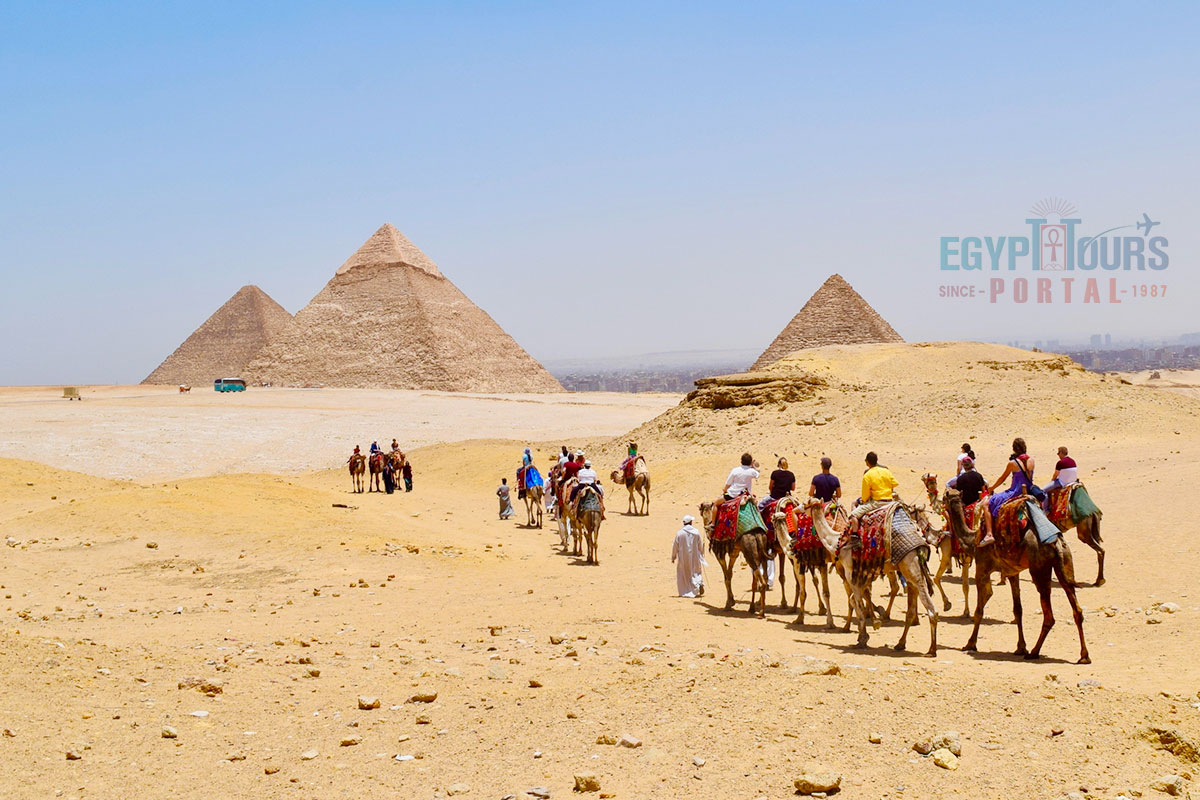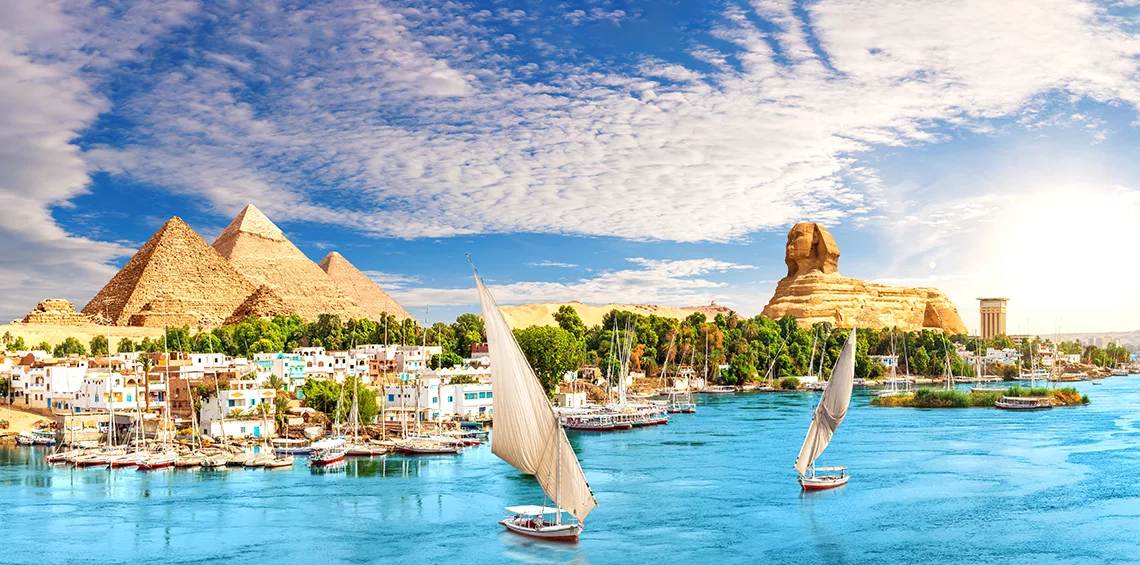
Egypt. The very name conjures images of colossal pyramids piercing the azure sky, pharaohs adorned with gold, and the life-giving Nile River winding its way through a vast desert. It’s a land where history isn’t just read in books; it’s etched in stone, whispered on the desert winds, and felt in the very air you breathe. Traveling to Egypt is more than just a vacation; it’s a pilgrimage into the heart of one of civilization’s most enduring legacies.
This comprehensive guide will equip you with everything you need to embark on your unforgettable Egyptian adventure, from understanding its rich tapestry of history to navigating its bustling cities and serene landscapes.
A Tapestry Woven with Millennia: A Glimpse into Egypt’s History

Related Articles about Journey Through Time: Your Comprehensive Guide to Traveling to Egypt:
- Ooh La La, France Awaits: Your Comprehensive Guide to an Unforgettable Journey
- The Emerald Isle Beckons: Your Comprehensive Travel Guide to Sri Lanka
- Singapore: A Jewel Box of Experiences – A Comprehensive Guide
- The Grand Tapestry of India: A Comprehensive Guide to Embarking on Your Unforgettable Journey
- Beyond the Glitz: Exploring the Wonders of the United Arab Emirates
To truly appreciate Egypt, a basic understanding of its extraordinary history is essential. For over 3,000 years, ancient Egypt flourished, leaving behind an unparalleled legacy of monumental architecture, intricate hieroglyphs, and sophisticated societal structures.
- The Old Kingdom (c. 2686–2181 BCE): The age of the pyramid builders, most famously the Great Pyramid of Giza and the Sphinx. This era saw the consolidation of royal power and the development of complex administrative systems.
- The Middle Kingdom (c. 2055–1650 BCE): A period of reunification and artistic flourishing, characterized by more realistic art and literature, and the expansion of trade.
- The New Kingdom (c. 1550–1070 BCE): The golden age of Egypt, home to famous pharaohs like Hatshepsut, Akhenaten, Tutankhamun, and Ramesses the Great. This era witnessed vast empires, magnificent temples like Karnak and Luxor, and elaborate tombs in the Valley of the Kings.
- The Late Period and Foreign Rule: Egypt faced periods of foreign domination by Persians, Greeks (under Alexander the Great, leading to the Ptolemaic dynasty and Cleopatra), and Romans, each leaving their distinct mark.
- Islamic Egypt: Following the Arab conquest in the 7th century CE, Egypt became a center of Islamic culture and learning, with Cairo emerging as a prominent city. This era brought stunning mosques, madrasas, and a vibrant artistic and intellectual scene.
- Modern Egypt: From Ottoman rule to British influence and finally independence in the 20th century, modern Egypt has navigated complex political landscapes while striving to preserve its rich heritage.

Understanding this historical arc will transform your experience from sightseeing to a profound connection with the past.
Top Attractions: Where History Comes Alive
Egypt’s attractions are vast and varied, catering to every interest. Here are some of the absolute must-sees:
- The Pyramids of Giza and the Sphinx: No trip to Egypt is complete without witnessing these iconic structures. Marvel at the sheer scale of the Great Pyramid, explore the surrounding complex, and ponder the enigmatic gaze of the Sphinx.
- The Egyptian Museum (Cairo): A treasure trove of ancient artifacts, this museum houses an astounding collection, including the treasures of Tutankhamun, mummies of pharaohs, and countless statues and sarcophagi. The new Grand Egyptian Museum (GEM) is set to become the world’s largest archaeological museum and is increasingly opening its doors.
- Luxor: Often referred to as the "world’s greatest open-air museum," Luxor is home to some of the most impressive ancient sites.
- Karnak Temple Complex: A sprawling religious city dedicated to the god Amun-Ra, with colossal columns, obelisks, and sanctuaries.
- Luxor Temple: Beautifully illuminated at night, this temple offers a glimpse into the grandeur of pharaonic worship.
- Valley of the Kings: The burial ground of pharaohs and nobles from the New Kingdom, where you can descend into elaborately decorated tombs, including Tutankhamun’s.
- Valley of the Queens: The resting place of queens and royal children, most famously the tomb of Nefertari.
- Hatshepsut’s Temple: A stunning mortuary temple built into a cliff face, showcasing remarkable architecture and intricate reliefs.
- Abu Simbel: Two massive rock-cut temples built by Ramesses II, famously relocated in the 1960s to save them from the rising waters of Lake Nasser. The sheer scale and intricate carvings are breathtaking.
- Aswan: A tranquil city on the Nile, known for its Nubian culture, granite quarries, and the beautiful Philae Temple.
- Philae Temple: Dedicated to the goddess Isis, this temple is located on an island and is accessible by boat, offering a romantic and picturesque experience.
- Unfinished Obelisk: A colossal obelisk that, if completed, would have been the largest ever carved, offering insight into ancient quarrying techniques.
- Nubian Villages: Experience the vibrant culture and hospitality of the Nubian people with a visit to their colorful villages.
- Nile River Cruise: An essential part of the Egyptian experience. Sailing along the Nile allows you to witness ancient sites from a unique perspective, relax in comfort, and experience the timeless rhythm of life along the river. Most cruises run between Luxor and Aswan.
- Alexandria: Egypt’s second-largest city, founded by Alexander the Great, offers a different historical perspective with its Greco-Roman heritage. Visit the Catacombs of Kom el Shoqafa, the Bibliotheca Alexandrina (a modern revival of the ancient library), and the Citadel of Qaitbay.
- Red Sea Resorts (Hurghada, Sharm El Sheikh): For those seeking relaxation and adventure, Egypt’s Red Sea coast offers world-class diving, snorkeling, and pristine beaches.
Planning Your Egyptian Adventure: Essential Travel Tips
Navigating a country with such a rich history and diverse offerings requires some preparation. Here are key tips to make your trip smooth and enjoyable:
- Visa Requirements: Most nationalities require a visa to enter Egypt. This can often be obtained on arrival at the airport or applied for online in advance. Check the latest regulations for your specific nationality.
- Best Time to Visit:
- October to April: This is the peak tourist season and the most pleasant time to visit. The weather is mild and sunny, perfect for exploring ancient sites without the intense heat.
- May to September: This period is very hot, especially in Upper Egypt (Luxor and Aswan). While you might find fewer crowds and better prices, be prepared for high temperatures and plan your activities accordingly.
- Shoulder Seasons (April-May and September-October): Can offer a good balance of pleasant weather and fewer crowds.
- Currency: The Egyptian Pound (EGP). ATMs are widely available in cities and tourist areas. Credit cards are accepted in larger hotels, restaurants, and shops, but cash is essential for smaller vendors and local markets.
- Language: Arabic is the official language. English is widely spoken in tourist areas, hotels, and by guides. Learning a few basic Arabic phrases like "Shukran" (thank you) and "Salam alaikum" (hello) will be appreciated.
- Dress Code: Egypt is a Muslim country. While tourist areas are generally more relaxed, it’s respectful to dress modestly, especially when visiting religious sites. This means covering your shoulders and knees. Lightweight, breathable clothing is recommended.
- Safety and Security: Egypt is generally a safe country for tourists. However, it’s always wise to be aware of your surroundings, avoid displaying large amounts of cash, and be cautious of overly friendly strangers offering unsolicited help. Stick to reputable tour operators and transportation.
- Health: Consult your doctor about recommended vaccinations before your trip. Drink bottled water only and be mindful of street food. Carry a basic first-aid kit.
- Bargaining: Haggling is a part of the culture in markets and with taxi drivers. Be polite, firm, and have a price in mind. It’s an art form, and part of the fun!
- Tipping (Baksheesh): Tipping is customary in Egypt for services rendered. Small amounts are appreciated for porters, waiters, drivers, and even toilet attendants.
- Photography: Be respectful when taking photos of people, especially women. Always ask for permission. Some historical sites may have restrictions on photography.
Accommodation Options: From Luxury to Budget-Friendly
Egypt offers a wide range of accommodation to suit every budget and preference:
- Luxury Hotels: Found in major cities like Cairo, Luxor, and Aswan, offering world-class amenities, stunning views, and excellent service. Many boast historical charm or modern elegance.
- Nile Cruise Ships: A popular choice for experiencing the wonders of Upper Egypt. These range from luxurious five-star vessels to more budget-friendly options, all offering comfortable cabins and onboard amenities.
- Boutique Hotels: Often found in historical buildings, offering a more intimate and personalized experience with unique character.
- Guesthouses and Hostels: Available in popular tourist hubs, offering a more affordable option for budget travelers and backpackers.
- Apartment Rentals: For longer stays or those seeking more independence, apartment rentals can be a good option.
- Nubian Villages: In Aswan, staying in a traditional Nubian guesthouse offers a unique cultural immersion.
Transportation: Navigating the Land of the Pharaohs
Getting around Egypt is an adventure in itself. Here are the primary modes of transport:
- Flights: The quickest way to cover long distances, especially between Cairo and Luxor/Aswan. EgyptAir is the national carrier.
- Trains: A comfortable and scenic way to travel between major cities, particularly Cairo, Luxor, and Aswan. Overnight sleeper trains are a popular option for longer journeys.
- Buses: A more budget-friendly option for intercity travel, though journeys can be longer and less comfortable than trains.
- Nile Cruises: As mentioned, a fantastic way to travel between Luxor and Aswan, combining sightseeing with relaxation.
- Taxis and Ride-Sharing Apps: Widely available in cities. Negotiate fares before the journey or use ride-sharing apps like Uber and Careem for transparent pricing.
- Microbuses: A local and very affordable way to get around within cities, but can be crowded and a bit chaotic for tourists.
- Felucca: Traditional sailboats on the Nile, offering a charming and serene way to experience the river, especially in Aswan.
Embarking on Your Journey
Traveling to Egypt is a profound experience that will leave you with a deep appreciation for human ingenuity, artistic expression, and the enduring power of history. From the awe-inspiring pyramids to the tranquil Nile and the vibrant culture, Egypt promises an unforgettable adventure.
Before you go:
- Book Flights and Accommodation in Advance: Especially during peak season.
- Research and Plan Your Itinerary: Decide which attractions are most important to you.
- Consider a Guided Tour: For a deeper understanding of the history and culture, a knowledgeable guide can significantly enhance your experience.
- Pack Appropriately: Light clothing, comfortable walking shoes, sun protection, and a scarf for modest dress.
- Get Your Finances in Order: Inform your bank of your travel plans and carry some local currency.
Egypt awaits, ready to unveil its timeless wonders and share its captivating stories. Pack your curiosity, your sense of adventure, and prepare to be transported to a land where the past and present dance in a spectacular, enduring embrace. Your journey through time begins now.





